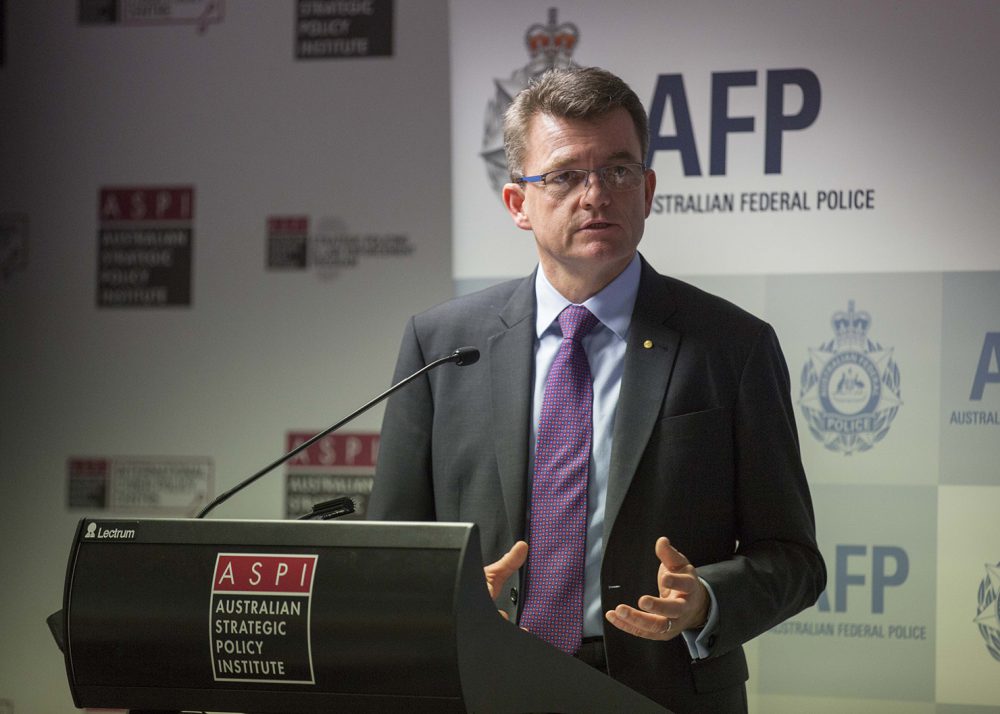Colvin’s departure will leave a gaping hole in the AFP

After a distinguished policing career spanning more than 30 years, including five in the top job as Australian Federal Police Commissioner, Andrew Colvin has decided to call it a day.
For the first 25 years of his career, Colvin was an operational police officer who shunned the spotlight. His commitment to his work saw him quickly become one of Australia’s counterterrorism experts—a title he would be uncomfortable with. In 2003, he was awarded a Medal of the Order of Australia for his role in the police investigation of the Bali bombing and the victim-identification process. So in 2014, when he was appointed commissioner, more than a few in Canberra were scratching their heads and asking, ‘Who’s Colvin?’
While there can be little doubt that he achieved much in these years, it’s been the past five years as top cop where he has made a lasting difference. During his time as commissioner, Colvin has proved that he is the first of a new generation of senior law enforcement officials.
That isn’t because he was significantly younger than most Australian police commissioners and Commonwealth law enforcement agency bosses when he was appointed. Neither is it because he was Harvard-educated and is far more cerebral than most of Australia’s operational police.
These are factors that have shaped his thinking and leadership style, but what really set Colvin apart was the energetic honesty he has brought to the office of commissioner and his commitment to challenge those around him to consider ‘How can we be better?’
Colvin’s new school of policing values a strategic approach that focuses on solving problems and working with partners. But he has done more than ponder problems. While many a retired commissioner has recognised that police can’t arrest themselves out of problems like illicit drug use, Colvin has been working hard to develop innovative policing responses.
By challenging the policing status quo, Colvin has earned wide respect from Canberra’s senior policymakers.
In contrast, getting more traditional-thinking police officers to embrace his new law enforcement approaches has been challenging. Old-school policing has a sharp operational focus on the good ‘pinch’ (arrest) of senior criminals, large drug busts and big cash seizures rather than solving the underlying problems.
There can be no doubt that the AFP has achieved much while Colvin has been at the helm. It has been critical in the disruption of 16 terror plots since 2014. It has consistently broken illicit drug seizure records, and the list of other more operational successes is lengthy.
In 2016, concerned about bullying and harassment, Colvin had former sex discrimination commissioner Elizabeth Broderick undertake an independent review of the AFP. And he then courageously made the damning findings publicly available, before embarking on a comprehensive agenda for change.
While they may not be directly linked to their service, five workplace suicides since February 2017 will leave Colvin reflecting on whether he could have done more.
Then, in March 2018, likely much to the chagrin of Home Affairs Minister Peter Dutton, Colvin told a Senate estimates committee that his 6,500-strong organisation faced a ‘supply and demand’ challenge. The commissioner described a force experiencing greater demand for its services in the face of increasing crime.
But arguably Colvin’s greatest achievements are related to his commitment to developing new law enforcement strategies while maintaining the statutory independence of the AFP.
Despite the formation of the Department of Home Affairs, and Dutton’s ‘old school’ punitive approach to law enforcement, Colvin has vigorously defended in private and public the statutory independence of the AFP.
In two months’ time, when Colvin leaves the AFP, his legacy will be broad and lasting.
The next AFP commissioner will need strength of character, political acumen and tenacity to ensure the AFP remains strategically focused on community safety rather than on delivering on the government’s tough talk. The AFP will also need a commissioner who can proactively defend it against any encroachment by Home Affairs into operational matters.
Finding a suitable replacement for Colvin will be no easy task. The next commissioner will need to resolve several issues.
To start, there’s a growing global surplus of illicit drugs, such as cocaine and heroin, which is driving down wholesale drug prices. Criminal groups in the Golden Triangle and Mexico have shifted their focus to the production and distribution of synthetic drugs. And since 2015, East and Southeast Asia have become the leading subregions for methamphetamine seizures worldwide.
The continued globalisation of Australia’s crime problem is shifting policing responsibilities from the states and territories to the Commonwealth.
The bottom line is that the AFP is facing a widening gap between the amount of crime that’s occurring and its capacity to respond.
At the same time, the AFP’s budget has been in a steady state of decline for several years.
The AFP’s supply-and-demand challenge has had deep impacts on the morale and wellbeing of its workforce.
Conspiracy theories that Colvin had ‘seen the writing on the wall’ or was walking away from the fallout of the media raids don’t stack up. His adroit interview yesterday on the ABC’s 7.30 illustrates his ability to answer the tough questions.
The truth is that, on several occasions leading up to his appointment as AFP commissioner, Colvin clearly stated that he would only ever do one term as Australia’s top cop. So, if this week’s announcement shows anything, it’s that, as always, Colvin is a man of his word.
There are still some weeks to go, but, unfortunately, Colvin’s departure on 1 October will leave a gaping hole in Australia’s law enforcement community that will be difficult to fill at a time when the AFP’s independence is under sustained threat.